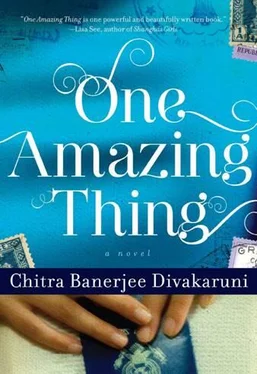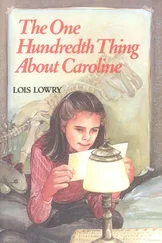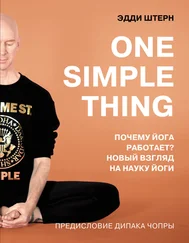But Ammi didn’t leave a message. She hung up and called again. This was so unlike her that I answered. She was crying hard; I couldn’t understand what she was saying. Finally, I figured it out. Four men had come into Jalal’s this morning and taken Hanif and Abba. They hadn’t even let them make a call. Musa from the bakery next door had seen the whole thing happen and had phoned Ammi. He told her the men were dressed in suits and drove a black van; two of them were white and two were African American; the whole thing was over quickly. No, he didn’t think to write down the license number. He was too scared. No, they hadn’t hurt Abba or Hanif, not from what he could see, but they had been gripping them firmly by the arm.
I couldn’t afford to panic-Ammi was upset enough-but my insides felt frozen. We’d heard about things like this. Government agents, some said the FBI, would pick up people from our community. Sometimes there was a reason; often there wasn’t-at least not anything that was explained to the detainees. Some were released within a few days. For others, it took much longer. We knew men who had been deported, along with their families.
I told my friends what had happened, and Ali said right away that he would skip class and come with me. I was in no state to drive. Ali took me home. We picked up Ammi and went on to Jalal’s. Musa was waiting for us, but he didn’t have any new information to give. We went inside the office. Everything was in its place (my father was a tidy man); there was no sign of the upheaval that had turned our lives upside down.
We phoned friends, and friends of friends-anyone we could think of. They were shocked but not of much help. A few, I sensed, were afraid of getting too closely involved, as if our bad luck might be contagious. Finally, someone put us in touch with a lawyer who specialized in such cases. He had a hefty fee, though at this point we didn’t care. Abba still hadn’t phoned us. I gave the lawyer all of Abba’s documents that I could find. One of Ammi’s cousins came to stay with us because Ammi was getting hysterical, banging her head on the floor, calling on Allah to spare her husband, and I didn’t know how to stop her.
Maybe the lawyer had friends in high places, or maybe the men who took him realized that Abba was innocent of whatever they had suspected him of doing, or maybe my mother’s desperate prayers worked. After three days Abba was returned to Jalal’s-with no more explanation than when he had been taken. Musa saw him sitting on the pavement beside the locked door of the office and called us. On Abba’s face was the vacant expression of the men who sleep on the streets. By the time we got there, Musa had taken Abba into the bakery, had helped him wash his face, and had given him a glass of lime water. But Abba just sat holding the glass. I was afraid that Ammi would go to pieces, but although her face got very pale, she drew on reserves of strength that I didn’t know she possessed.
Over the next days, she remained close to Abba. She ran her hands over each part of his body to make sure he hadn’t been injured. She talked to him about old times-their courtship and marriage, the first house they had lived in, my antics when I was little. She sang children’s lullabies. She assured him that we loved him and would take care of him. She told him he didn’t have to talk about anything he didn’t want to, and if he preferred to forget the last few days, that was all right with her. She would forget them with him. I don’t know what a Western psychologist would have made of her methods, but my father responded to the constant flow of her soft voice. In a few days he was moving around the house, impatiently telling us he didn’t need babysitters. One evening he even helped Ammi roll out chapatis like he used to. We thought the worst was over.
Then he had the stroke.
It happened when he was alone in the family room, watching TV. When Ammi found him, he had slipped to the floor, unconscious. By the time the ambulance arrived, parts of his brain had shorted out. When we brought him home, after a lengthy and expensive hospital stay, he couldn’t move his left arm and leg.
AMMI AND I WENT BACK TO THE LAWYER; HE ADVISED US TO let things be. There were no signs of physical torture on my father. There weren’t even official records of his having been arrested. Who would we go to, asking for reparation? It was a bad time for Muslims in America. It would be best if we didn’t stir up trouble. Besides, we were better off than many. Take the case of Hanif, who hadn’t been returned at all. No one knew where he was, or if he was alive.
To my mother, he said, “Sister, I tell you this not as a lawyer but as a fellow Muslim. What use is it to say, we are in the right and they are in the wrong? I could take your money and start a case, like I’ve done for several families. But all the cases are dragging on, with no end in sight. Better, if you have friends and family in India, to take Jalal-Miah-and your son, if he is wise-and retire there. The dollar still goes a long way back home, and you can get servants to help with Miah’s problems. Best of all, among thousands who look like you, you’ll draw no attention. Here, you are on their radar. For all you know”-he looked pointedly at my beard-“they’re watching your son right now.” He shook his head in a way that frightened Ammi.
When Ammi returned home, she requested her closest friends-a handful of people I had called Uncle and Aunty since childhood-to come over to the house; then she asked them what she should do. My father, who had always been fiercely independent, lay helpless in his bed upstairs. The thought that we were deciding his fate twisted my heart.
At this meeting, there were arguments and raised voices, cursing and tears, and contradictory counsel. But at the end our friends admitted that given my parents’ situation, retiring in India wasn’t a bad option. They didn’t think my mother and I could keep Jalal’s Janitorial going on our own. News of my father’s “arrest” had already caused more customers to cancel their accounts. Abbajan’s medical insurance covered many things, but there were still a lot of expenses that we had to handle. I didn’t have a job-and even when I finished college, it was unlikely that I would get a good one right way. There wasn’t going to be enough money for my parents to keep living here.
“Don’t expect it to be easy,” they warned her. “You enjoyed your visits to India as a rich NRI, with your pockets full of dollars. But living within modest means, with servants who don’t show up in the morning and bribes that have to be paid to the right people in the right manner, is a different matter.”
The uncles and aunties were not sure what I should do. They felt I wouldn’t fit in in India after having been raised here. I had the same doubts. Apart from lifestyle differences, there was another issue: This was my country. I was an American. The thought of being driven from my home filled me with rage. Then again, if I stayed in India, it would be a great support for my parents. Already Ammi looked at me with longing. Farah would like that, too. Conflicting loyalties warred in my head, keeping me awake at night.
UMA THOUGHT SHE HEARD A SOUND ABOVE, AS WHEN SOMEONE turns over in an old, creaky bed. She stiffened and looked around, but the others were engrossed in the story. You’re imagining things, she told herself sternly. She forced her attention away from the ceiling’s mutterings and to the painful inevitability of Tariq’s tale.
WITHIN THE WEEK, THOUGH I WARNED AMMI NOT TO RUSH into decisions, she put our house up for sale and asked Farah’s mother to find her a small ground-floor flat not too far from their house. After the phone call, Ammi spent a long time in the bathroom and emerged with red eyes. Hard as it was for me to see the house I had grown up in on the market for uncaring strangers to walk through and comment on, it was harder for Ammi. The daily chore of taking care of my father-of assisting him into bed and out, placing him in his wheelchair, helping him to the toilet-was taking its toll on her body, too. My father didn’t make it easier. Always a sweet-natured man, he now developed a terrible temper. I was having problems of my own: everywhere I went people seemed to stare at me. Once or twice, I thought a black van followed me off the freeway into our neighborhood.
Читать дальше












